|
|
|
Sort Order |
|
|
|
Items / Page
|
|
|
|
|
|
|
| Srl | Item |
| 1 |
ID:
193065


|
|
|
|
|
| Summary/Abstract |
The two decades of war in Afghanistan left a mark on the American armed forces and redefined the American ways of war-making. One of this war’s legacies is the reimagining of the role of private military and security contractors in contemporary warfare. Due to the massive involvement of the private sector in the American war machine, this industry transformed from a marginal participant into a central partner. The privatization of military and security functions became a norm, an integral part of security architecture and military operation. In this study, I provide a brief review of this development and its implications.
|
|
|
|
|
|
|
|
|
|
|
|
|
|
|
|
| 2 |
ID:
193067
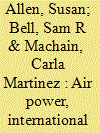

|
|
|
|
|
| Summary/Abstract |
Can the presence of international organizations reduce civilian deaths caused by aerial bombing? This commentary examines this question in the specific context of the U.S.-led war in Afghanistan. We evaluate this based on interviews conducted with members of international organizations that were present in Afghanistan during the conflict, existing intergovernmental organizations, nongovernmental organizations, and government reports, and with quantitative data on civilian casualties between 2008 and 2013. We conclude that there is tentative evidence from Afghanistan that international organizations can in fact reduce the severity of civilian killings that result from the use of air power. However, there is much need for greater data sharing to more fully answer this important question.
|
|
|
|
|
|
|
|
|
|
|
|
|
|
|
|
| 3 |
ID:
193056
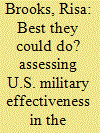

|
|
|
|
|
| Summary/Abstract |
This article explores shortcomings in military effectiveness in the war in Afghanistan. It focuses on three sets of problems: the failure to resolve internal contradictions in the training effort, the failure to integrate political considerations with military activity, and poor strategic and operational/tactical integration.
|
|
|
|
|
|
|
|
|
|
|
|
|
|
|
|
| 4 |
ID:
193062


|
|
|
|
|
| Summary/Abstract |
The Western defeat in Afghanistan was due to an inadequate process of strategic reflection informed, first, by an overestimation of the attractiveness of the Western political agenda to Afghans and, second, by overconfidence in the effectiveness of its military approach. As a corollary, popular support for the Taliban was underestimated. The insurgents possessed a degree of what we term strategic cohesion—a sociopolitical and military embeddedness within society—that produced a far stronger strategic effectiveness than we could replicate in our Afghan allies. Furthermore, a military-professional mindset underestimated the degree to which political considerations permeated the battlefield. The political effect of military actions was insufficiently integrated into strategic practice. Specifically, the linchpin officer in staff planning and field operations in Western armies struggled to act as what we term strategic colonels. In both respects, the war continues to offer important lessons for Western involvement in future conflict, including with Russia and China.
|
|
|
|
|
|
|
|
|
|
|
|
|
|
|
|
| 5 |
ID:
193055
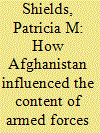

|
|
|
|
|
| Summary/Abstract |
This commentary examines the influence of the Afghanistan war on the content of Armed Forces & Society. My 20-year tenure as editor of Armed Forces & Society overlaps completely with the war. Using the lenses of the postmodern or post-Cold War military, I reflect on how the articles of this journal were influenced by the war. The postmodern military relies more heavily on volunteers, is more likely to engage in unconventional missions, and more likely to use multinational forces. I found an increase in articles devoted to reserve forces and contractors. In addition, many articles investigated the unique management challenges of the International Security Assistance Force (ISAF). The multiple deployments and brutal nature of the war led to a large increase in health/mental health articles and also contributed to changes in the scope of the military family and veterans’ literature. The limited civil–military relations literature was affected indirectly.
|
|
|
|
|
|
|
|
|
|
|
|
|
|
|
|
| 6 |
ID:
193063
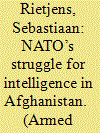

|
|
|
|
|
| Summary/Abstract |
What role did North Atlantic Treaty Organization (NATO) and the coalition (International Security Assistance Force—ISAF) it led play in the failure of the West in Afghanistan? This essay argues that the ISAF intelligence community’s inability to come to grips with the complex operational environment in Afghanistan contributed to the problem. Using three concepts from the complexity literature, requisite variety, learning, and enactment, I analyze critical flaws in NATO’s approach. ISAF’s weak cross-cultural competence, its inconsistent relationships with international civilian organizations, and its absence of double- and triple-loop learning are identified as key drivers of NATO’s weak intelligence performance.
|
|
|
|
|
|
|
|
|
|
|
|
|
|
|
|
| 7 |
ID:
193066
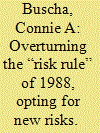

|
|
|
|
|
| Summary/Abstract |
The evolution of the status of American women as warriors between Operation Desert Shield/Desert Storm in 1990-1991 and the War in Afghanistan, beginning in 2001 [and simultaneously the Iraq War in 2003] is explored. This era of American civil-military history included rescinding the ‘Risk Rule’ of 1988, the formal ban on women serving in ground combat units. This generation of women’s legitimate military service as warriors began. The Afghanistan War period also exposed, however, the physical and emotional risks military women often face from their own colleagues on a global scale in the form of sexual violence. As a society, we purposefully must eliminate such risks inherent in the contemporary All-Volunteer Force (AVF) and clean up the resulting messes before we even consider taking the risk of conscription and mass mobilization of American women in our next war.
|
|
|
|
|
|
|
|
|
|
|
|
|
|
|
|
| 8 |
ID:
193054


|
|
|
|
|
| Summary/Abstract |
This article introduces the Symposium on the Afghanistan War. During and after the American withdrawal from Afghanistan, emotions ran high. This special issue responds to public calls for further in-depth study of the Afghanistan War. We assembled an international array of interdisciplinary scholars who address reasons the mission became a misadventure. Additional papers focus on the consequences borne by the people who served and the institutions that fought America’s longest war.
|
|
|
|
|
|
|
|
|
|
|
|
|
|
|
|
| 9 |
ID:
193064


|
|
|
|
|
| Summary/Abstract |
This essay reflects on the broad contours of the war in Afghanistan from Southeast Asia’s perspective. While the United States’ withdrawal from Kabul was calamitous, the pessimism about America’s role in Southeast Asia has been overstated. The United States’ withdrawal from Afghanistan was largely inconsequential for the region. Southeast Asian states deftly mixed their support for America’s campaign in Afghanistan and the broader war on terror without being seen as too sympathetic, including, in some instances, condemnation of America’s attacks on Islam. Regional governments balanced their domestic political interests with their foreign policy objectives. The abrupt Afghan withdrawal may instead have positive outcomes, as the United States boosted its courtship with countries of Southeast Asia and the broader Indo-Pacific region through new security arrangements such as the Quadrilateral Security Dialogue (Quad) and the Australian, U.K., and U.S. trilateral pact (AUKUS).
|
|
|
|
|
|
|
|
|
|
|
|
|
|
|
|
| 10 |
ID:
193061


|
|
|
|
|
| Summary/Abstract |
The American war in Afghanistan was originally an act of retaliation and retribution. Over time it assumed the moral burden of state-building. The state-building effort however was undermined by inadequate planning, inadequate knowledge, and inadequate understanding of the complexity and difficulty of the state-building process. Ultimately, the Afghanistan state-building effort failed. The commentary assumes the premise that even in an era of great power competition, the West cannot escape the challenge of state-building as fragile and failing states will continue to threaten global security. The commentary suggests a set of considerations for those responsible for the inevitable state-building challenges of the future.
|
|
|
|
|
|
|
|
|
|
|
|
|
|
|
|
| 11 |
ID:
193059


|
|
|
|
|
| Summary/Abstract |
The United States government’s inability to view the conflict with the Taliban through the lens of the bargaining model of war was a fundamental element of its failure in Afghanistan. This problem was reinforced by a dysfunctional civil–military relations shaped by Samuel Huntington’s theory of objective control, resulting in the military pursuing campaigns of attrition that fit its organizational preferences but did not advance civilian political goals. These issues are evident in three different moments during the War in Afghanistan where the U.S. failed to seize an opportunity that could have changed the result of the conflict.
|
|
|
|
|
|
|
|
|
|
|
|
|
|
|
|
| 12 |
ID:
193060
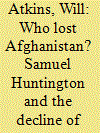

|
|
|
|
|
| Summary/Abstract |
Numerous reflections exist regarding who should be held accountable and what lessons should be learned from the military withdrawal and political collapse of Afghanistan. This essay argues that the failures in Afghanistan are second- and third-order effects of a failure of strategic thinking on behalf of civilian and military leadership alike. I argue that this failure of strategic thinking is caused, in part, by the overreliance on concepts of civil–military relations espoused by Samuel Huntington. These concepts have been inculcated by a professional military education system that has subsequently developed a generation of officers with an atrophied appreciation for the political aspects of war, and an inability to link operational prowess to the achievement of strategic objectives. This dilemma is aggravated by a similar overreliance on systematic thinking, which further obscures the linkages between the military and political aspects of strategy.
|
|
|
|
|
|
|
|
|
|
|
|
|
|
|
|
| 13 |
ID:
193057


|
|
|
|
|
| Summary/Abstract |
On October 7, 2001, 3 weeks after 9/11, U.S. forces attacked Afghanistan; bombers struck Taliban headquarters and Al Qaeda training sites. By early December, the Taliban and Al Qaeda have been defeated and had fled. However, a war that began so successfully in 2001, eventually ended ignominiously on August 30, 2021, almost exactly 20 years later, with a U.S. withdrawal and a total Taliban victory. The speed of the Taliban’s triumph shocked everyone. The entire campaign, costing US$2.3 trillion and 2,488 U.S. lives, had failed—utterly. The United States had lost its longest-ever war. How is it possible to explain a defeat of that magnitude? This article seeks to address this question. Although numerous factors played a role, this article identifies three principal factors: the environment, the local politics, and the Taliban. Afghanistan is a very difficult place to conduct large-scale military operations. The West never came to terms with the local politics and consequently undermined their own efforts. Finally, although they were not militarily sophisticated, the Taliban were politically astute and very resilient.
|
|
|
|
|
|
|
|
|
|
|
|
|
|
|
|
| 14 |
ID:
193058
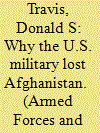

|
|
|
|
|
| Summary/Abstract |
Why did Afghanistan falter as a U.S. partner? America’s war in Afghanistan was lost for many reasons, but the U.S. military contributed to its downfall in two ways. First, U.S. combat units, trained to fight conventional battles, conducted counterterrorism operations (aka “search and destroy” missions) against guerilla forces that resulted in hardening the resolve of the enemy while causing widespread and senseless civilian casualties. Second, the Afghan military could not exist without U.S. logistical and material support. Because the Afghan Army was trained and equipped to fight a conventional-type war, they were incapable of operating independent of U.S. support, and could not survive on their own against guerrilla forces in a protracted civil war. Therefore, the Afghan security forces were not properly trained and equipped, demonstrating that the U.S. military repeated mistakes of the Vietnam War. It is argued that the United States must temper its conventional warfare mindset and re-direct resources toward improved ways to conduct limited wars against irregular adversaries. The constabulary forces concept described by Morris Janowitz is a feasible way to improve the chances that U.S. forces will succeed in such limited wars.
|
|
|
|
|
|
|
|
|
|
|
|
|
|
|
|
|
|
|
|
|